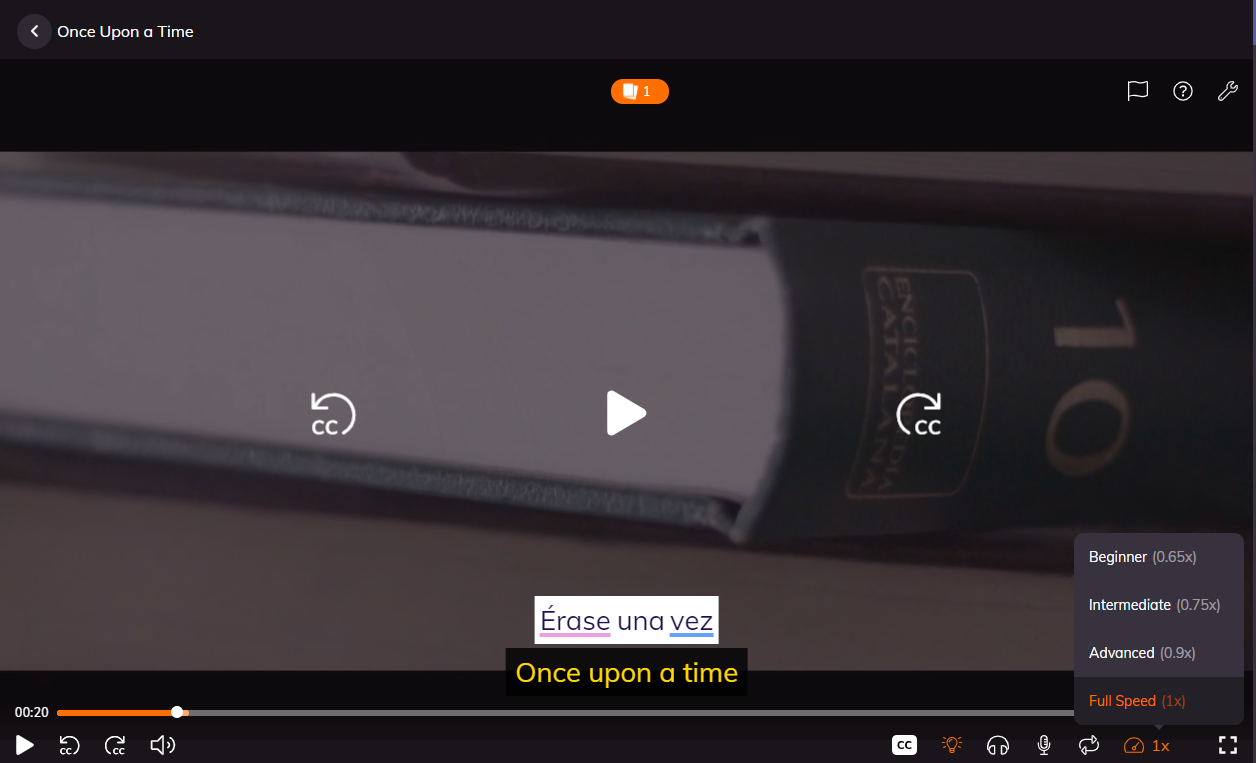Learn Spanish with Movies and TV Shows
written by: Krystof-Sandor Harfst
Table of Content
Discount on Lingopie
Explore Lingopie to Learn Spanish Effortlessly
Embarking on the journey to learn Spanish becomes an immersive and enjoyable experience with Lingopie. The platform offers a treasure trove of Spanish movies and series designed to make language acquisition seamless. Dive into captivating storylines and cultural nuances while picking up the intricacies of the Spanish language effortlessly.
Why is Lingopie the Best Choice to Learn Spanish?
Lingopie stands out as an unparalleled platform for mastering Spanish. Its extensive collection of Spanish content provides learners with the flexibility to select shows that align with their interests. Moreover, Lingopie's innovative technology incorporates dual subtitles, enabling learners to comprehend dialogue while grasping the written form simultaneously.
The Easiest Way to Learn Spanish
Learning Spanish on Lingopie feels like a natural process. The platform's user-friendly interface and curated content mimic the immersive learning experience. By watching Spanish shows with context-rich subtitles, learners absorb grammar, vocabulary, and pronunciation intuitively, mimicking real-life language acquisition.
Dramatically Increase Your Vocabulary
Lingopie serves as a catalyst for expanding Spanish vocabulary effortlessly. Through exposure to diverse contexts, phrases, and expressions in movies and series, learners organically acquire new words and phrases. Interactive subtitles on Lingopie provide real-time definitions, synonyms, and explanations, ensuring a holistic and seamless learning journey.
Watch and Learn on the Go
Flexibility is key in modern language learning, and Lingopie delivers just that. The platform's accessibility across various devices empowers learners to watch Spanish shows and movies anytime, anywhere. Whether commuting, taking a break, or relaxing at home, Lingopie offers the convenience to continue your Spanish language immersion.
Best Spanish Shows to Watch on Lingopie
Lingopie boasts a diverse array of Spanish content suitable for learners at all proficiency levels. For beginners, series like "La Casa de Papel" or "Élite" offer engaging narratives that aid language acquisition. Intermediate learners can delve deeper into Spanish culture and society with shows like "Las Chicas del Cable" and "Vis a Vis."
La Casa de Papel (Money Heist)
A group of robbers, led by "The Professor," executes a meticulous plan to rob the Royal Mint of Spain. Tensions rise as the heist progresses, revealing personal and complex relationships among the robbers.
Genre: Crime, Drama, Thriller.
Spanish Vocabulary: Bank robbery terms, criminal jargon, negotiation phrases, Spanish idioms, police and investigation terminology.
Oswaldo
An animated series featuring Oswaldo, a furry blue creature living in a zoo. The show follows his humorous adventures as he interacts with other zoo animals.
Genre: Animated, Comedy.
Spanish Vocabulary: Everyday conversational Spanish, humor and wordplay suitable for a younger audience.
Los Misterios de Laura
Genre: Crime, Mystery.
Spanish Vocabulary: Detective and crime-solving terms, police investigation vocabulary, interpersonal communication in a professional setting.
La Ronca de Oro
Genre: Biographical, Drama, Music.
Spanish Vocabulary: Musical terms, historical and biographical vocabulary, expressions related to passion and determination.
Élite
The lives of wealthy teenagers intertwine with those of less privileged students at an elite Spanish high school. The series explores issues of class, privilege, and the consequences of impulsive actions.
Genre: Crime, Drama, Thriller.
Spanish Vocabulary: Teenage slang, school-related terms, interpersonal relationships, crime and investigation vocabulary.
La Isla Del Tesoro (Treasure Island)
An adaptation of the classic adventure novel "Treasure Island" by Robert Louis Stevenson. The story follows a young man's quest for hidden treasure on a mysterious island.
Genre: Adventure, Family.
Spanish Vocabulary: Nautical terms, adventure-related vocabulary, family and friendship expressions.
Victor Ros
Set in 19th-century Madrid, Victor Ros, a detective, solves crimes using innovative forensic methods. The series combines historical elements with detective intrigue.
Genre: Crime, Historical.
Spanish Vocabulary: Historical terms, detective and crime-solving vocabulary, 19th-century language.
Sabuesos
A comedic series featuring a detective with an unconventional approach to solving crimes. The show blends humor with crime-solving in an entertaining manner.
Genre: Comedy, Crime.
Spanish Vocabulary: Detective and crime-related humor, everyday conversational Spanish.
La Casa De Las Flores
A dark comedy about a dysfunctional wealthy Mexican family who runs a prestigious flower shop. Secrets are exposed as the family faces various challenges.
Genre: Comedy, Drama.
Spanish Vocabulary: Family-related terms, humor, expressions related to social issues.
El Secretario
Genre: Comedy, Romance.
Spanish Vocabulary: Office and workplace terms, romantic expressions, comedic language.
Kitty Is Not a Cat
An animated family series centered around Kitty, a girl who magically transforms into a cat. The show explores the adventures and challenges she faces in both human and feline forms.
Genre: Animated, Family.
Spanish Vocabulary: Everyday conversational Spanish suitable for a younger audience.
Hotel Romanov
A drama-mystery series set in a hotel, where secrets, mysteries, and intrigues unfold. The show explores the lives of the hotel staff and guests.
Genre: Drama, Mystery.
Spanish Vocabulary: Hotel-related terms, mystery and suspense vocabulary.
De Levante
A drama-romance series set in a coastal environment. It follows the lives of characters as they navigate relationships, romance, and challenges in a seaside setting.
Genre: Drama, Romance.
Spanish Vocabulary: Coastal and beach-related terms, romantic expressions.
La Bruja (The Witch)
A horror-mystery series involving supernatural elements and mysteries surrounding a witch. The show explores the dark and eerie side of its characters' lives.
Genre: Horror, Mystery.
Spanish Vocabulary: Horror and supernatural terms, mystery vocabulary.
Sissi: La Joven Emperatriz
A historical-romance series portraying the life of Empress Elisabeth of Austria, known as Sissi. The show delves into her relationships, struggles, and the historical context of the time.
Genre: Historical, Romance.
Spanish Vocabulary: Historical and royal terms, romantic expressions.
Talking Tom & AmIgos
An animated comedy suitable for a younger audience, featuring Talking Tom and his friends. The series explores the humorous adventures and interactions of these animated characters.
Genre: Animated, Comedy.
Spanish Vocabulary: Everyday conversational Spanish suitable for a younger audience, humor.
El Continental
An action-crime drama set in a dangerous and thrilling world. The series follows the challenges faced by its characters in a crime-infested environment.
Genre: Action, Crime, Drama.
Spanish Vocabulary: Crime-related terms, action and drama vocabulary.
Antes de Perder
A drama-romance series that explores the emotional journey of characters facing the prospect of loss. The show delves into the complexities of relationships and personal struggles.
Genre: Drama, Romance.
Spanish Vocabulary: Emotional expressions, romantic vocabulary.
Las Chicas del Cable
Set in the 1920s, it follows the lives of four women working as telephone operators at a telecommunications company in Madrid. The show delves into their personal and professional challenges.
Genre: Drama, Romance.
Spanish Vocabulary: Historical terms, technology-related terms, romantic expressions.
Dinofroz
An animated adventure series with prehistoric themes. The show follows characters as they embark on adventures in a world filled with dinosaurs and other ancient creatures.
Genre: Animated, Adventure.
Spanish Vocabulary: Adventure-related terms, prehistoric vocabulary.
Control Z
When a hacker starts revealing students' secrets, a socially isolated student named Sofia works to uncover the culprit. The show delves into the impact of technology on teenage relationships.
Genre: Drama, Mystery, Thriller.
Spanish Vocabulary: Teenage slang, technology-related terms, mystery and thriller vocabulary.
¿Quién Mató a Sara? (Who Killed Sara?)
After serving 18 years for a crime he didn't commit, Álex Guzmán seeks revenge on the Lazcano family. The mystery unfolds as he investigates the death of his sister, Sara.
Genre: Crime, Drama, Mystery.
Spanish Vocabulary: Crime investigation terms, mystery vocabulary, family-related expressions.
Vis a Vis (Locked Up)
A young woman, Macarena Ferreiro, is imprisoned for financial crimes. The series explores her struggles to adapt to prison life, the friendships formed, and the challenges she faces inside.
Genre: Crime, Drama, Thriller.
Spanish Vocabulary: Prison-related terms, crime and thriller vocabulary.
Tiempo Libre
A drama series that revolves around characters seeking personal freedom and self-discovery. The show explores how individuals navigate their lives during their leisure time, facing challenges, making choices, and finding meaning in their pursuits. The narrative may delve into various aspects of personal and social life, reflecting the characters' journeys during their free time.
Genre: Drama.
Spanish Vocabulary: Everyday conversational Spanish, expressions related to free time.
Felicity
A drama-romance series centered around a college student named Felicity. The show explores her experiences, relationships, and personal growth during her time at university.
Genre: Drama, Romance.
Spanish Vocabulary: College and relationship-related terms, romantic expressions.
Sky Rojo
Three women on the run from their exploitative pimp navigate a dangerous journey. The series blends action and drama, exploring themes of empowerment and resilience.
Genre: Action, Adventure, Crime.
Spanish Vocabulary: Action and crime-related terms, adventure vocabulary.
Sagrada Familia
A drama-family series that delves into the lives of a family, exploring their relationships and challenges. The show touches on themes of family dynamics and personal growth.
Genre: Drama, Family.
Spanish Vocabulary: Family-related terms, drama vocabulary.
Cupido
A romantic-comedy series that explores the humorous and unpredictable aspects of love. The show follows characters as they navigate the ups and downs of romantic relationships.
Genre: Comedy, Romance.
Spanish Vocabulary: Romantic expressions, comedic language.
Why Should You Learn Spanish?
- Widespread Global Use:
- Spanish is one of the most spoken languages globally, with over 460 million native speakers. It is the second most spoken language in the world by native speakers, making it highly practical for communication in various countries.
- Cultural Enrichment:
- Learning Spanish opens the door to the rich and diverse cultures of Spanish-speaking countries. This includes literature, music, art, cinema, and traditions that contribute to a deeper appreciation of global cultural diversity.
- Professional Opportunities:
- Spanish is often considered an asset in the professional world. Many businesses and organizations value employees who can communicate in Spanish, especially in industries like tourism, international business, healthcare, and education.
- Travel:
- Knowing Spanish can enhance your travel experiences in numerous Spanish-speaking countries. You can navigate more easily, interact with locals, and immerse yourself in the local culture, making your travel more fulfilling.
- Broadening Communication Skills:
- Learning a second language, such as Spanish, improves overall cognitive abilities and enhances linguistic and analytical skills. It challenges the brain to think in different ways, leading to improved problem-solving and multitasking abilities.
- Educational Opportunities:
- Spanish is the second most commonly spoken language in terms of native speakers. Learning Spanish can provide access to a wealth of educational resources, including literature, academic publications, and online content.
- Connection with a Global Community:
- Speaking Spanish connects you with a vast community of people worldwide. It allows you to engage with individuals from various backgrounds, fostering understanding and cooperation in a globalized world.
- Personal Growth:
- Learning a new language is a fulfilling personal challenge. It boosts confidence, provides a sense of accomplishment, and opens up opportunities for personal growth and self-discovery.
- Language of Diplomacy:
- Spanish is one of the six official languages of the United Nations. Proficiency in Spanish can be advantageous for individuals interested in international relations and diplomacy.
- Enjoyment of Spanish Media:
- Access to a plethora of Spanish movies, TV shows, literature, and music becomes more enjoyable when you can understand the language. It adds a new dimension to entertainment and cultural appreciation.
Discount on Lingopie
Share this article!






